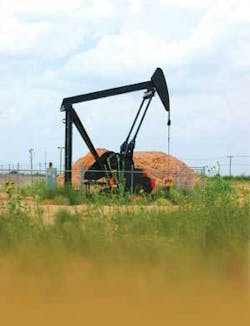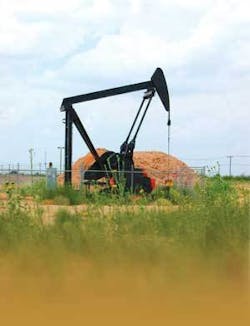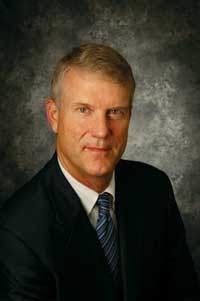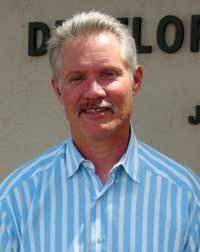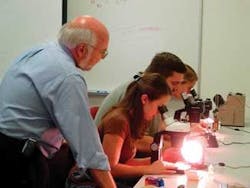Continuing education for oil and gas professionals
The top 25 oil companies have shed more than one million employees since 1982, and those who managed to hang on are now rapidly approaching retirement age. After years of steadily eliminating jobs, the industry may not have the manpower and brainpower to keep up with the world’s growing demand for oil and gas.
Mikaila Adams, Associate Editor, OGFJ
Driving from the Midland International Airport to downtown Midland was less than eventful. For the most part, wide open spaces and pump jacks were all the eyes could see. However, a trip to Midland College and the new Petroleum Professional Development Center tells a different tale - one of opportunity and growth. The training center is just one among a growing number of such facilities poised to put a dent in the energy workforce crisis.
Photo by Mikaila Adams
This crisis was highlighted in the September 2005 issue of OGFJ. The problem is particularly acute among geologists, geophysicists, petroleum engineers, and landmen - professionals who traditionally have formed the backbone of petroleum exploration and production.
According to the US Bureau of Labor Statistics, more than 25% of the working population will reach retirement age by 2010, resulting in a potential worker shortage of nearly 10 million. By 2030, with the last of the baby boom generation turning 66, an unprecedented 20% of the population will be over age 65.
Another problem highlighted is the cyclical nature of the business and its effect on the workforce. The top 25 oil companies have shed more than one million employees since 1982, and those who managed to hang on are now rapidly approaching retirement age. After years of steadily eliminating jobs, the industry may not have the manpower and brainpower to keep up with the world’s growing demand for oil and gas.
There is a strain to catch entry-level and mid-career professionals up to speed with those seasoned professionals that are set to retire from the industry in the coming years. In the petroleum industry it can take up to a decade for a new graduate to “learn the ropes.” Accelerating changes in the energy industry and the need to address workforce challenges are reasons why continuing education for energy professionals is so important.
Photo courtesy of SMU Cox School of Business
“Many forward looking firms turn to university-based executive education programs to give their younger high potentials the business and leadership skills that will accelerate their progress across the gap,” said Frank R. Lloyd, PhD, associate dean, executive education, SMU Cox School of Business.
Midland College’s Petroleum Professional Development Center
Midland College’s Petroleum Professional Development Center (PPDC) provides local, cost-effective training for a broad range of topics.
Photo by Mikaila Adams
The students are working oil industry personnel with varied backgrounds and education - engineers, landmen, secretaries, investors, financial advisors, oil company accountants, etc. They are trying to gain a familiarity with the tools, techniques, and vocabulary of the geologists that they work with.
The center specializes in industry software training and provides multiple facilities for various classroom sizes. The center offers many software classes on a regular basis and can offer almost any commercial software training on demand.
The PPDC has two designated dual-monitor computer labs. One is on the main campus of Midland College and accommodates 8 people. The other lab is in the PPDC building and accommodates 6 people.
Photo by Mikaila Adams
The center also has single-monitor labs that seat from 20 to 40 attendees at the Midland College Advanced Technology Center.
API University
API University, owned and operated by the American Petroleum Institute, also provides continuing education for the oil and gas professional.
The facility has access to a large pool of subject experts in the industry, who utilize today’s innovative methods. The training offered at API enables participants to maintain professional competency and meet the changing statutory requirements in the industry.
The university has courses on operational risk, asset integrity, natural hazards, drilling fundamentals, production or plant operations, and security or quality/environmental auditing.
The facility offers structured classes held on-site as well as customized courses that can be presented at your facility. There is also the convenience of training electronically. API University offers more than 300 e-learning courses designed to provide flexible training opportunities.
Society of Petroleum Engineers
The Society of Petroleum Engineers (SPE) is also a great resource for continuing education.
Like other facilities, SPE offers short courses taught by university professors and industry professionals in such topics as drilling and completions, health, safety and environment, management and information, multi-discipline (such as intelligent well technology), production and operations reservoir description and dynamics.
One unique training method getting results is the eMentoring program. eMentoring allows young professionals to tap into the knowledge and experience of seasoned E&P professionals. Mentoring enhances younger professionals’ understanding of a specialized field or technical discipline. They benefit from practical career advice on day-to-day issues and obtain guidance during the transition into the working world.
eMentoring is a convenient and effective way to connect young professionals (fewer than five years in the industry) and students with more experienced members. In addition to being mentored themselves, young professionals have the opportunity to mentor students. This “trickle down effect” is a great way to impart knowledge, not only on young professionals, but students looking to enter the industry.
SMU Cox Executive Education
For those that possess the technical skills but need more emphasis in learning the business side, the SMU Cox School of Business offers the Executive Education program. Located in the James M. Collins Executive Education Center on the campus in Dallas, the school offers access to faculty from a nationally and globally ranked business school as well as “hands on” insight from business professionals.
Dr. Michel Vetsuypens, professor of finance at SMU’s Cox School of Business states, “The wave of corporate reorganization that we have witnessed in the oil and gas industry in the last 20 years has resulted in significantly flatter organizational structures.”
“A significant knowledge gap has opened between oil and gas managers’ traditional technical training (geology, geosciences, reservoir engineering, etc.) and the business knowledge required of them on the job.
As employees move up in the organization, they find that technical skills matter less than business acumen, financial skills, accounting knowledge, capital allocation expertise, leadership know-how, strategic insights, and the like. This is where focused executive education comes in: by providing exposure to critical business skills, we aim to close this knowledge gap.”
One such program is the Strategic Financial Skills for the Energy Industry course that provides an understanding of the essentials of the financial side of the energy industry.
This course is designed for those non-financial managers who want to achieve some degree of financial literacy in an energy industry setting. It is also helpful for financial managers who wish to sharpen their skills, broaden their base of knowledge, and relate their functional skills to a broader, general management context.
The typical participant has more than five years of management experience. Participants are generally from either oil and gas firms or from firms in related energy industries, such as pipeline companies, service and supply organizations, government agencies, or financial institutions.
The program also offers Custom Executive Education programs that are designed to offer companies solutions to specific corporate training needs. These programs are done “in-house” so they are cost efficient for the company who wants to train a larger group of individuals.
Companies like Anadarko, ChevronTexaco, Conoco Phillips, Maguire Oil Co., Occidental, Pioneer Natural Resources, and Sonangol send their managers to SMU Cox Executive Education’s programs to receive this type of extra training.
Conclusion
Along with the growth of the energy industry and $70 oil comes the struggle to keep qualified professionals at the helm. Training facilities like the ones mentioned are working to ensure that tomorrow’s energy leaders are as knowledgeable and capable as those leaving the patch.
Training and continuing education centers in places like Houston, Dallas, Midland, and wherever the oil and gas industry has a presence are gearing up to become part of the solution to the aging energy workforce. It’s one large step in the right direction.
